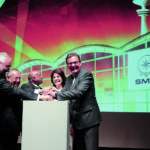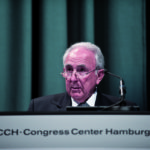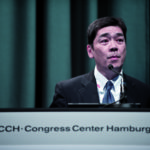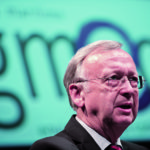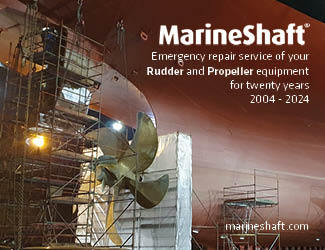
The global environmental maritime congress (gmec), a high-calibre summit meeting of the maritime industry marks a successful premier. »Setting the green course« was the slogan of gmec held in Hamburg on 7 and 8 September. The participants at this conference all agreed that the slogan could hardly ha[ds_preview]ve been better chosen .Environmental and climate protection were the dominant topic at »gmec 2010« with high-ranking members of the International Maritime Organization (IMO), the EU, government bodies as well as port authorities, classification societies and shipbuilders gethered in Hamburg to discuss the industry‘s environmental challenges as well as business opportunities evolving from environmental awareness. The ultimate goal of the conference is to further decrease ecologically harmful emissions worldwide, thus reducing the maritime industry‘s share in the global emission of CO2 and respirable dust. But also sustainable waste management and a considerate approach to handling ballast water are crucial factors for a healthy marine environment. Many of the technologies needed already exist as the simultaneous SMM 2010 proof.
52 speakers in 5 panels and participants from 36 countries analyse the current environmental status of shipping and to show possible solutions for better protection of the maritime environment, coastal regions and ports. With such vitally important subjects on the agenda, the organiser succeeded in attracting the most eminent speakers. These industry experts included the three gmec Chairmen – Micky Arison, Chairman and CEO, Carnival Corporation, the world’s largest cruise operator (Carnival Cruise Line, Princess Cruises, Costa Cruises, Aida Cruises); Dr. Corrado Antonini, Chairman Fincantieri; and Spyros Polemis, Chairman International Chamber of Shipping (ICS).
»We have a duty to protect the maritime environment, to use resources more efficiently, and to go beyond the requirements of international environmental legislation,« said Micky Arison, setting out the expectations for gmec, while at the same time a large number of the world’s merchant fleet, comprising nearly 50,000 ships, already have a high standard of energy efficiency and low carbon emissions of 0.1 kilograms per TEU and kilometre (by comparison, road trucks produce 2.3 kg carbon per TEU and kilometre). gmec lived up to these expectations.
After definition of the foremost environmental challenges for shipping, speakers discussed the goals in tackling the problems, such as reduction in emissions of carbon, sulphur dioxide (SOx), nitrogen oxide (NOx) and particulate matter, and also noise emissions. Methods discussed included the use of new marine engines, shaft generators, the introduction of solar and wind power, and fuel cells. In some cases it is even possible to build »zero pollution ships«. Measures were also described for treating liquid and solid wastes on board. Other presentations outlined design shapes and engineering measures for further improvements in energy efficiency of ships – such as an air-lubrication system which substantially reduces frictional losses of the ship’s hull as it moves through the water, and solutions to minimise emissions in ports that can result from shipping, e.g. by means of shore-based power supply systems, or the use of liquid natural gas (LNG) for power supply.
Jochen Deerberg from the Organisers Office gmec and Managing Partner of Deerberg Systems is convinced of theis new forum: »This is the first time that the leading thinkers in the maritime industry have got together to talk about practical environmental protection». »I am pleased to say that all the lectures were of an exceptionally high standard, both in content and in presentation. The industry has recognised that it has already achieved a great deal in environmental protection. But it was also clear that there is still much to be improved, especially in air emissions. There are already a great many technical methods for doing that available today. Passenger shipping has a leading role to play here«, he added.
To be continued …
gmec will in future be a regular fixture in the international schedule of the maritime industry. The next gmec will be organised by Hamburg Messe und Congress on the occasion of the SMM 2012 – the world’s premier shipbuilding trade show. gmec aims to present concrete projects and success stories. »Here at gmec we are giving the industry the world’s only forum for development of joint opportunities to make shipping more sustainable, and to present these results to the general public,« said Bernd Aufderheide, President and CEO of Hamburg Messe und Congress GmbH.
Industry leaders on gmec:
This conference was a very good start. It gave opportunities to talk to a great many people. We will now see what effects gmec has in practice.
Spyros Polemis, Chairman, International Chamber of Shipping (ICS)
Of course we had meetings in the past, in smaller groups. But the gmec framework is unique. It shows that the industry is working with great sensitivity and a positive spirit on »sustainable shipping«. That is also a signal which is going out from the conference. The expertise of participants at gmec was very high. An outstanding feature was the close relationship with SMM, as a joint venture between ship builders and marine equipment suppliers.
Bernard Meyer, Managing Partner, Meyer Werft shipyard
This is the first time that a meeting like this has been initiated by industry representatives. It shows the enormous commitment of shipbuilders and shipowners to environmental protection.
Dr. Corrado Antonini, Chairman Fincantieri
The conference was a very good opportunity to promote green shipping, to make presentations to the public, and to exchange ideas on know-how with the other participants. The panels were full of really expert speakers.
Masahiro Samitsu, Corporate Officer and General Manager of the Environment Group, NYK Line
I am confident that this conference has brought together the different interests of industry and the environment. Because it really had the goal of anticipating problems before they get too big to solve.






